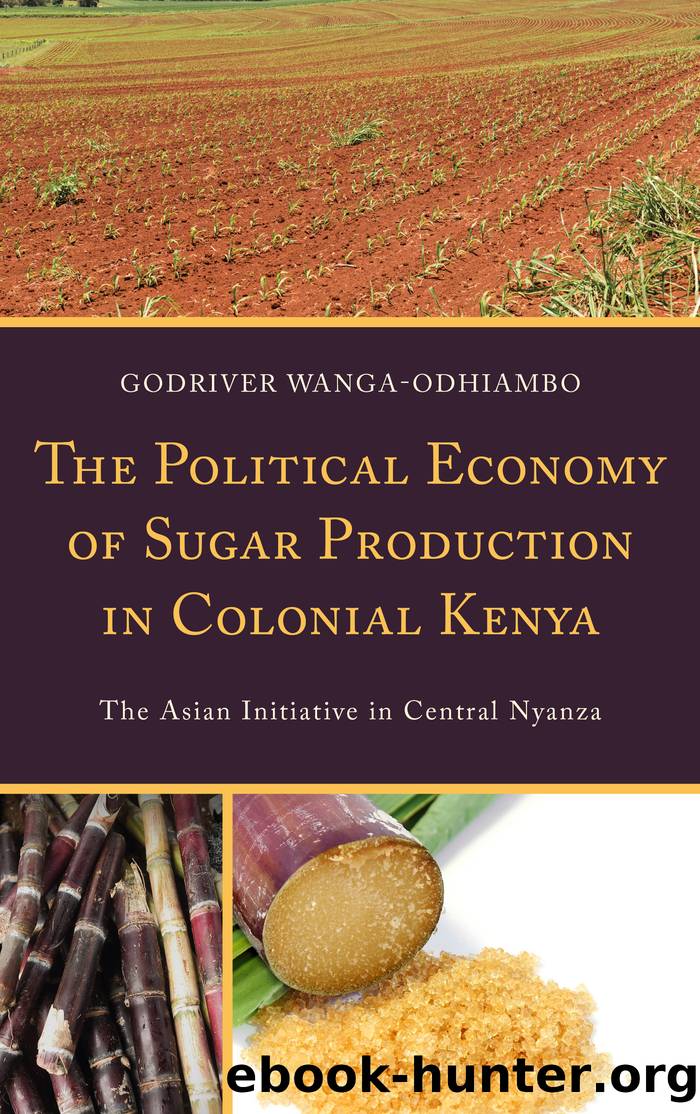The Political Economy of Sugar Production in Colonial Kenya by Wanga-Odhiambo Godriver;

Author:Wanga-Odhiambo, Godriver;
Language: eng
Format: epub
Tags: undefined
Publisher: Lexington Books/Fortress Academic
Published: 2012-08-15T00:00:00+00:00
The Colonial Stateâs Control of Sugar Market, 1951â1963
The previous section demonstrated how the sugar industry picked up in the late 1940s and the total acreage increased tremendously. The Asian manufacturers gave the industry a new lease on life despite the neglect by the colonial state. Even peasant commodity production flourished, despite the dominance of European settler production.[103] Once more the contradictory nature of the colonial state was witnessed as the Asian sugarcane production experienced both support and neglect during the colonial period.
By early 1950s, the colonial state was less supportive of its sugar industry than were Kenyaâs neighboring territories. This was seen in 1950 when the colonial state did not want to engage in international sugar discussions and adamantly refused to join the conference in London that was called to discuss export quotas. The colonial state, instead of attending to see how it could benefit the Asian farmers, dismissed the whole conference, arguing that Kenya had no prospects of exporting sugar in any foreseeable future, a position that was contrary to the potential of the Nyanza sugar belt.[104] The decision not to attend the conference was made partly because the colonial state saw that there was a constant demand for sugar due to the fast-growing population, a rise in purchasing power among Africans, and the new trend of adaptation to a varied diet. As such, the state adopted a policy geared toward self-sufficiency and not exports of sugar. Therefore, in 1951 the government set up prices for sugar; grade I was sold at Shs. 6.09 per pound while grade II fetched Shs. 4.85 per pound.[105] To attain their goal of self-sufficiency by 1953, the government further granted the sugar millers an increase in the price of Kenyaâs white sugar in 1953, which also led to an increase in the price of sugarcane given to the growers by Miwani Sugar Mills for various varieties as follows:
Uba: Shs. 29.71 per ton
Download
This site does not store any files on its server. We only index and link to content provided by other sites. Please contact the content providers to delete copyright contents if any and email us, we'll remove relevant links or contents immediately.
The Vikings: Conquering England, France, and Ireland by Wernick Robert(79224)
Ali Pasha, Lion of Ioannina by Eugenia Russell & Eugenia Russell(39941)
The Vikings: Discoverers of a New World by Wernick Robert(36831)
The Conquerors (The Winning of America Series Book 3) by Eckert Allan W(36716)
Cecilia; Or, Memoirs of an Heiress — Volume 1 by Fanny Burney(32094)
Cecilia; Or, Memoirs of an Heiress — Volume 3 by Fanny Burney(31482)
Cecilia; Or, Memoirs of an Heiress — Volume 2 by Fanny Burney(31436)
Empire of the Sikhs by Patwant Singh(22780)
Hans Sturm: A Soldier's Odyssey on the Eastern Front by Gordon Williamson(18341)
The Secret History by Donna Tartt(18269)
Cat's cradle by Kurt Vonnegut(14804)
Sapiens: A Brief History of Humankind by Yuval Noah Harari(14006)
Pimp by Iceberg Slim(13828)
Talking to Strangers by Malcolm Gladwell(12916)
Norse Mythology by Gaiman Neil(12880)
Leonardo da Vinci by Walter Isaacson(12834)
Underground: A Human History of the Worlds Beneath Our Feet by Will Hunt(11857)
4 3 2 1: A Novel by Paul Auster(11843)
The Radium Girls by Kate Moore(11652)
